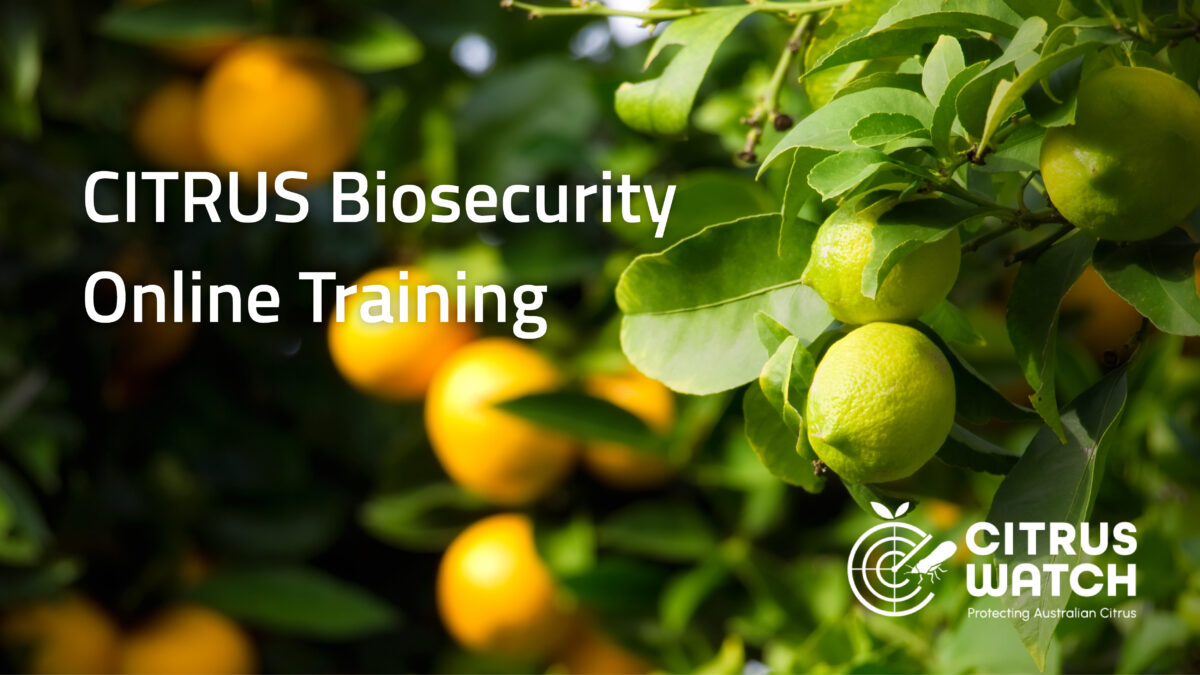Introducing a new citrus online training course
The Australian citrus industry has a sizable production base that requires protection from exotic pests and diseases. With 1,500 businesses directly involved in citrus production, and many associated businesses providing support services to grow, harvest, pack, transport, and market citrus, the wider citrus industry contributes to the economies of many regional areas.
An incursion and establishment of exotic citrus psyllid-huanglongbing (HLB) or citrus greening complexes would have the potential to decimate citrus growing businesses. Early detection of an Asian citrus psyllid (ACP) incursion (vector of the HLB pathogen) is a priority for the Australian citrus industry.
In an effort to bolster industry biosecurity preparedness, CitrusWatch was developed in 2022 to increase activities in the areas of surveillance and biosecurity capability.
CitrusWatch has developed a new online training course for the citrus industry and other stakeholders to improve biosecurity capability. The course was developed for use by the Early Detector Network volunteers, industry members, and government staff who are most likely to be on the frontline of exotic citrus pest surveillance and identification.
The Early Detector Network volunteers help protect Australian citrus growers from the impact of harmful exotic pests by deploying sticky traps and sending panels to entomologists for further diagnostics.
The course consists of two modules and will support ongoing CitrusWatch activities by ensuring that nationally consistent training is provided to volunteers and sub-contractors involved in the program, and in related industry activities.
Module 1 focusses on ‘Surveying for exotic psyllids and Module 2 centres around the ‘Identification of exotic psyllids’. The course presents content in a slide format, pop up information, case studies, videos, knowledge quizzes, and several downloadable factsheets.
The course is aimed at citrus businesses, industry entomologists involved in trap screening; selected volunteer trappers in urban areas, sub-contractors who participate in CitrusWatch’s annual targeted surveillance activities, and industry crop scouts involved in the industry Korea-China-Thailand (KCT) export Program.
These learning modules, provides industry-based entomologists and growers involved in CitrusWatch, with improved confidence to detect priority suspect exotic species of citrus and an improved understanding of how to report suspect pests. Citrus industry crop scouts involved in the KCT Program will also have a better understanding of how to look for these exotic species.
Government staff, such as surveillance and diagnostics staff, may also find the course beneficial to upskill, and to improve the chance of detecting exotic pests of citrus during normal activities and during incursion responses. Government National Biosecurity Response Team members who are mobilised in the event of a serious exotic pest incursion, and the Federal Operational Science and Surveillance group that undertakes border surveillance activities, will also benefit from the course.
Through CitrusWatch engagement activities there is also scope to offer the course to stakeholders who regularly inspect or view high volumes of produce, plant matter and imports. This includes personnel in the following industries and roles:
- seaport personnel
- warehouse workers – particularly those at staging sites and distribution centres for imported products and fresh produce
- fresh produce wholesale and retail markets
- agritourism personnel
- culinary industry personnel
- green waste transfer station personnel.
